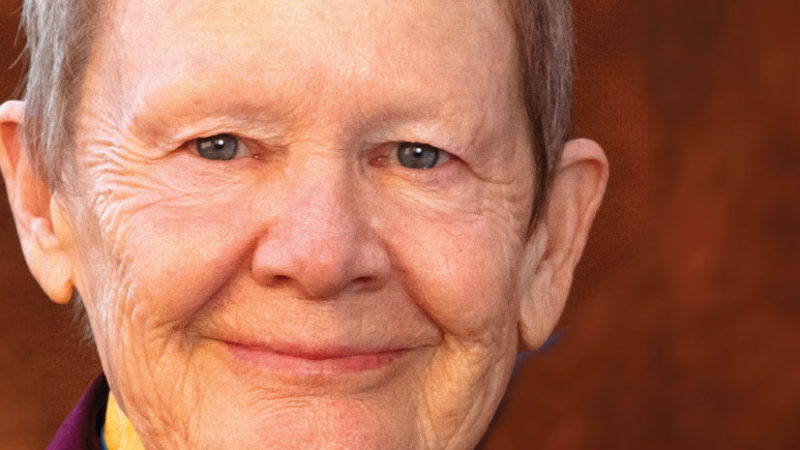The Tantric Consort: Awakening Through Relationship
Friends, I wanted to let you know about a four-part online video course that we created with Reggie Ray which explores intimacy as one of the most radical vehicles of spiritual transformation. The Vajrayana, or tantric tradition of Buddhism, teaches ways of being in relationship that serve as unique gateways to spiritual awakening. These teachings on the consort represent some of the most advanced teachings in Buddhism, and have been guarded and kept secret for the most part over the last 1000 years. What Reggie has discovered is that contemporary practitioners are uniquely situated to undertake some of their deepest spiritual work in the context of intimate relationship, however lack the perspective and practices needed to do so.
Watch Reggie’s video introduction here:
Learn more and access The Tantric Consort online course here.
Who Is the Tantric Consort?
The tantric tradition asserts that spirituality in its fullest sense cannot be an isolated, solitary, purely self-involved enterprise. Rather, we make the deepest journey of transformation and ultimate fulfillment only in relationship—with our deepest nature, with our unique karmic situations, with the people in our lives, and with the living universe around us. Through being in connection with these others, we are inspired, we love, and we open. We learn at the deepest levels that we are never one alone but always two-by-two, always in connection, always in the love relationship with all that is; and therein lies our life and our realization.
The tantric consort is the ultimate other. In fact, in the tantric tradition, it is said that moment by moment, he or she represents to us the entire phenomenal world. In other words, in the consort, we most deeply and completely meet the sacred universe in its entirety—a perhaps outrageous claim, but one that experience proves. Through the practice of taking the consort as representing the sacred totality, we learn to love more deeply than we ever imagined possible: first the consort, then everything that is. We see where we habitually hold back and hide out; we practice ways to release our masks, blockages, and obstacles; and ultimately we find union, where releasing our narcissistic fixation on ourselves and discovering our profound and eternal oneness with the consort—and through him or her the world—are the same thing. Ultimately, our ability to journey on the path of the tantric consort comes down to our own willingness, bravery, and devotion in cultivating an open heart and in learning to love the beloved openly and without limit.
By sharing ancient Vajrayana teachings on the view of the consort relationship as well as guiding us through specific, powerful meditations, Reggie leads us to both an understanding and an experience of the tantric consort as the gateway to our own awakening. He emphasizes learning practices that can be carried forward into our lives, including several heart-based meditations to be practices on our own or with a partner.
Many believe that the goal of spiritual practice is enlightenment or liberation, but the human being actually longs for much, much more. Instinctually, we yearn for what we know is possible: fulfillment, joy and union with all creation. Opening to our longing to connect with the tantric consort is the gateway and learning to relate with him or her openheartedly is the path.
Here is a summary of the course’s four parts:
Session 1: Relating with the Other as Sacred
The Vajrayana View of Consort Practice
Why is relationality the essence of Vajrayana spirituality? What special role does the consort play within the Vajrayana? Where do these teachings come from and how can the ancient practices of working with a consort be applied to our modern lives? What differentiates the consort relationship from conventional relationships? How does the consort appear in our life?
The guided meditation we will learn in Session One is The Thousand-Petaled Lotus Practice: Beginning to Open the Heart. Just as we establish the view on a conceptual level in order to engage in consort practice, we must also establish the ground of an open heart on a visceral level. The Thousand-Petaled Lotus Practice will become a gateway to all further consort practice for us.
Session 2: Genuine Presence
The Practice of Being a Consort
In Session Two we will discuss the qualities of a consort relationship—as well as each partner’s individual practice—that create a powerful container for spiritual transformation. Themes will include: staying close to your inspiration, becoming vulnerable, the nature of commitment in the consort relationship, courageous honesty, and relaxing the judgmental mind.
The commitment of tantric consorts to work with one another’s fullness—the brilliant array of light and dark, wisdom and neurosis, empowerment and injury that we each possess—becomes an invitation for consorts to explore their own vastness and become who they truly are.
We will also learn a meditation called Dissolving Blockages and Uncovering the Heart’s Unconditional Openness. Through our persistent, gentle practice we begin to wear away the armor that surrounds our hearts, revealing a luminous love that naturally opens to and receives our partner.
Session 3: Obstacles and Antidotes
Practices and Techniques for When the Going Gets Rough
In the consort relationship we are bound to encounter even more emotional and psychological “triggers” than in a conventional relationship, because we have explicitly committed to spiritual awakening, which requires that we go to and through the uncomfortable places; that we surf the endless waves of our own growth edges.
When those unavoidable experiences arise, how can we learn to welcome them with open arms, rather than to cower and escape into habitual behavior patterns? Session Three’s discussion will be on cultivating our bravery as spiritual warriors so we can engage these encounters differently than we have in the past.
In this session Dr. Ray will lead us through a meditation that applies especially well to moments of upheaval in relationship: Learning to Behold Our Intimate Partner with Our Heart.
Session 4: Meditation in Action
Healing Core Traumas with the Consort
It is said in the tradition that the consort “unbinds the fetters of the heart,” meaning that he or she frees us at the deepest levels of our being to love and to open that love to the world. Through consort practices, over time, the most hidden, unconscious blockages are called into consciousness so that we can see them, work with them, and resolve them. Often the emotional twists and distortions that underlie our current conscious ego prison go back to preverbal levels. Yet, as modern psychology shows us, these unconscious patterns control and limit what we can feel and see and experience, and ultimately block our ability to love fully.
This session will discuss the path of consort practice in its ability to heal and resolve our deepest wounds. Facing these traumas with the support of our tantric consort is a slow but liberating process that opens up our own capacity to experience life’s joy and fulfillment.
This session’s final guided meditation is a powerful one that can be practiced on one’s own or with a partner: A Consort Meditation for Dissolving Core Traumas and Obscurations. Dr. Ray will lead us through this meditation technique that can be applied again and again, either when core traumas arise naturally, or when we sit down with the intention of specifically engaging certain aspects of ourselves or our partner that we know need healing.






